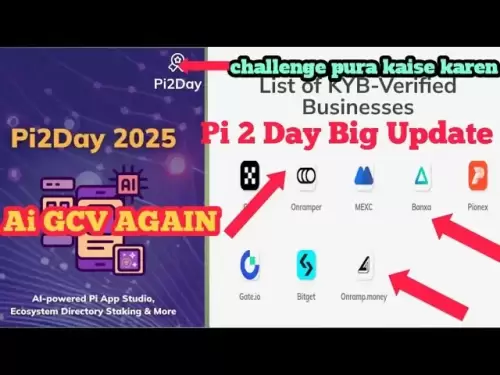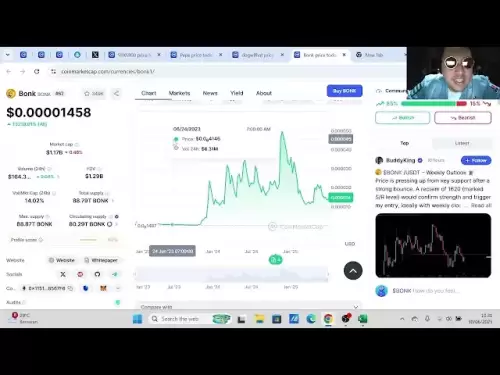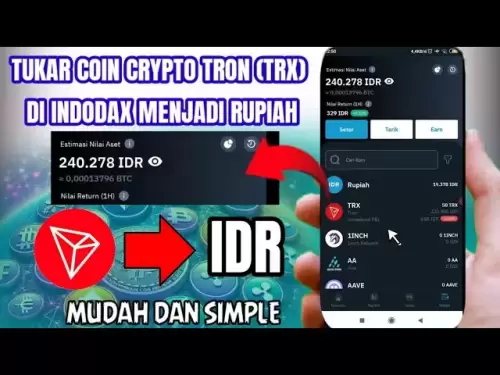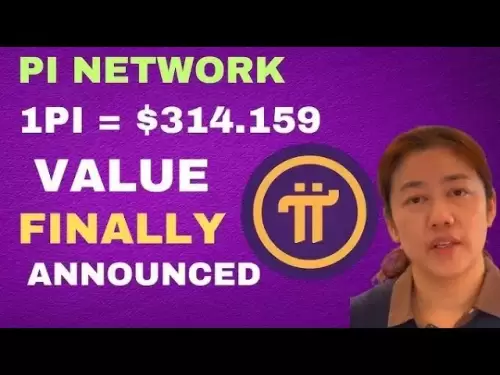-
 Bitcoin
Bitcoin $108,489.6704
1.13% -
 Ethereum
Ethereum $2,502.0528
2.92% -
 Tether USDt
Tether USDt $1.0002
0.00% -
 XRP
XRP $2.1941
0.51% -
 BNB
BNB $655.3375
1.00% -
 Solana
Solana $151.5977
1.27% -
 USDC
USDC $0.9999
0.00% -
 TRON
TRON $0.2768
0.32% -
 Dogecoin
Dogecoin $0.1676
2.86% -
 Cardano
Cardano $0.5675
0.98% -
 Hyperliquid
Hyperliquid $40.6109
7.48% -
 Bitcoin Cash
Bitcoin Cash $500.7746
2.09% -
 Sui
Sui $2.8328
2.03% -
 Chainlink
Chainlink $13.4452
1.26% -
 UNUS SED LEO
UNUS SED LEO $9.1623
0.39% -
 Avalanche
Avalanche $18.2267
2.24% -
 Stellar
Stellar $0.2382
0.00% -
 Toncoin
Toncoin $2.8885
1.68% -
 Shiba Inu
Shiba Inu $0.0...01159
0.91% -
 Litecoin
Litecoin $87.1827
0.88% -
 Hedera
Hedera $0.1511
2.90% -
 Monero
Monero $315.4992
-0.59% -
 Polkadot
Polkadot $3.4663
2.34% -
 Bitget Token
Bitget Token $4.6118
-0.65% -
 Dai
Dai $1.0000
-0.01% -
 Ethena USDe
Ethena USDe $1.0003
0.02% -
 Uniswap
Uniswap $7.2989
4.69% -
 Pepe
Pepe $0.0...01003
5.73% -
 Aave
Aave $275.5616
7.15% -
 Pi
Pi $0.5181
-2.49%
Is KAVA OTC trading safe? How to avoid being scammed?
KAVA OTC trading offers privacy but carries risks; ensure safety by choosing reputable brokers, verifying counterparts, and using secure communication.
May 08, 2025 at 01:21 am
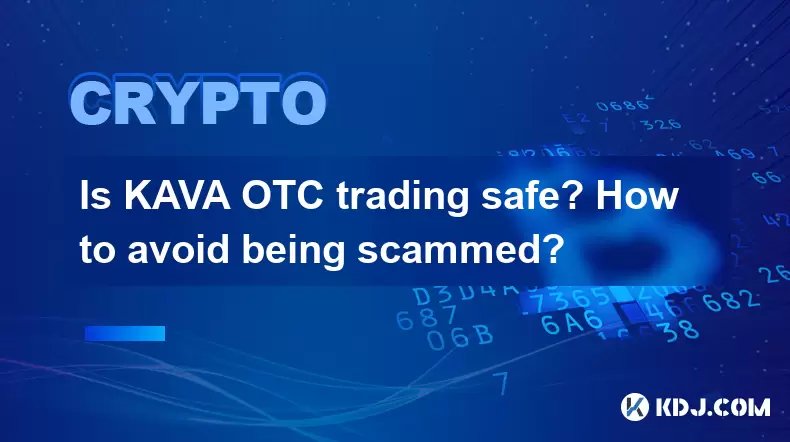
Is KAVA OTC trading safe? How to avoid being scammed?
Over-the-counter (OTC) trading of cryptocurrencies like KAVA can offer unique opportunities for traders looking to buy or sell large volumes of assets outside of traditional exchanges. However, the safety of OTC trading can vary, and it's crucial for traders to understand the risks involved and how to protect themselves from potential scams. This article will delve into the safety of KAVA OTC trading and provide detailed guidance on how to avoid being scammed.
Understanding KAVA OTC Trading
KAVA is a decentralized finance (DeFi) platform that offers various financial services, including lending, borrowing, and staking. OTC trading of KAVA involves direct transactions between two parties, typically facilitated by a broker or a specialized OTC desk. This method is often used for large trades that might otherwise affect the market price on public exchanges.
OTC trading can be safer in some ways because it allows for more privacy and can help avoid the slippage associated with large orders on public exchanges. However, it also comes with risks, as there is less regulatory oversight and fewer protections compared to trading on regulated exchanges.
Risks Associated with KAVA OTC Trading
When engaging in KAVA OTC trading, there are several risks to be aware of:
- Counterparty Risk: Since OTC trading involves direct transactions, there is a risk that the other party may default on the trade.
- Liquidity Risk: Finding a counterparty willing to trade the desired volume of KAVA can be challenging, especially for large trades.
- Scam Risk: The lack of regulatory oversight makes OTC trading more susceptible to scams and fraudulent activities.
How to Ensure Safety in KAVA OTC Trading
To ensure safety while trading KAVA OTC, consider the following steps:
- Choose a Reputable Broker: Work with well-established OTC brokers who have a track record of successful trades and positive reviews from other traders. Research their reputation and history before engaging in any transactions.
- Verify Counterparty: Before finalizing any deal, verify the identity and credibility of the counterparty. Use secure communication channels and consider using escrow services to hold funds until the trade is complete.
- Use Secure Communication: Communicate through encrypted channels to protect your personal and transaction information. Avoid sharing sensitive details over unsecured platforms.
- Set Clear Terms: Clearly define the terms of the trade, including price, volume, and payment method. Ensure both parties agree on these terms before proceeding.
Steps to Avoid Being Scammed in KAVA OTC Trading
Scams are a significant concern in the cryptocurrency space, and OTC trading is no exception. Here are detailed steps to help you avoid being scammed:
- Research Thoroughly: Before engaging with any OTC broker or counterparty, conduct thorough research. Look for reviews, testimonials, and any history of fraudulent activities. Use reputable sources and forums to gather information.
- Use Escrow Services: Consider using a third-party escrow service to hold funds until the trade is complete. This can provide an additional layer of security and ensure that both parties fulfill their obligations.
- Be Wary of Unsolicited Offers: Be cautious of unsolicited offers, especially those promising high returns or requiring immediate action. Scammers often use urgency to pressure victims into making hasty decisions.
- Verify Payment Methods: Ensure that the payment methods used are secure and reputable. Avoid using untraceable payment methods like certain cryptocurrencies or gift cards, as these are often used in scams.
- Monitor Transactions: Keep a close eye on your transactions and be alert for any suspicious activity. If something feels off, trust your instincts and pause the trade to investigate further.
Identifying Red Flags in KAVA OTC Trading
Recognizing red flags can help you avoid potential scams. Here are some common warning signs to watch out for:
- High-Pressure Tactics: Scammers often use high-pressure tactics to rush you into making a decision. If someone is pressuring you to act quickly, take a step back and reassess the situation.
- Unrealistic Promises: Be skeptical of offers that promise unusually high returns or guaranteed profits. If it sounds too good to be true, it probably is.
- Lack of Transparency: If the counterparty is unwilling to provide clear information about their identity, the terms of the trade, or the payment method, this is a major red flag.
- Poor Communication: If the counterparty is difficult to reach or frequently changes communication channels, this could indicate a scam.
Best Practices for Secure KAVA OTC Trading
To enhance the safety of your KAVA OTC trading, follow these best practices:
- Document Everything: Keep detailed records of all communications, agreements, and transactions. This can be helpful if disputes arise and can serve as evidence in case of fraud.
- Educate Yourself: Stay informed about the latest scams and security threats in the cryptocurrency space. Knowledge is your best defense against fraud.
- Use Multi-Signature Wallets: For added security, use multi-signature wallets that require multiple approvals for transactions. This can prevent unauthorized access to your funds.
- Regularly Update Security Measures: Keep your software, wallets, and communication tools up to date with the latest security patches and updates.
Frequently Asked Questions
Q: Can I use a traditional bank transfer for KAVA OTC trading?
A: Yes, you can use a traditional bank transfer for KAVA OTC trading, but it's important to ensure that the bank and the counterparty are reputable. Always verify the recipient's details and consider using an escrow service to add an extra layer of security.
Q: How can I verify the identity of my counterparty in KAVA OTC trading?
A: To verify the identity of your counterparty, you can use secure communication channels to request identification documents, such as a driver's license or passport. Additionally, consider using third-party verification services or platforms that specialize in identity verification.
Q: What should I do if I suspect I've been scammed in KAVA OTC trading?
A: If you suspect you've been scammed, immediately stop all communication with the suspected scammer. Report the incident to the relevant authorities, such as local law enforcement or the cryptocurrency platform's fraud department. Document all evidence and consider seeking legal advice to explore your options for recovery.
Q: Are there any specific tools or platforms that can help with KAVA OTC trading security?
A: Yes, several tools and platforms can enhance the security of KAVA OTC trading. Escrow services like Escrow.com can hold funds until the trade is complete. Additionally, using secure communication platforms like Signal or Telegram with end-to-end encryption can protect your conversations. Multi-signature wallets like those offered by BitGo can also add an extra layer of security to your transactions.
Disclaimer:info@kdj.com
The information provided is not trading advice. kdj.com does not assume any responsibility for any investments made based on the information provided in this article. Cryptocurrencies are highly volatile and it is highly recommended that you invest with caution after thorough research!
If you believe that the content used on this website infringes your copyright, please contact us immediately (info@kdj.com) and we will delete it promptly.
- Jasmy Coin, Bitcoin, and the Rise of Solaris Presale: What's the Buzz?
- 2025-06-30 18:30:12
- Wintermute, Bitcoin Lending, and Cantor Fitzgerald: A New Chapter?
- 2025-06-30 16:30:12
- Polkadot: From Ethereum Killer to Ghost Chain? The Crypto Fading Phenomenon
- 2025-06-30 16:50:12
- Bitget Lists NodeOps (NODE) for Spot Trading: A New Era for DePIN?
- 2025-06-30 16:30:12
- Warren Buffett, Bitcoin, and the Oracle of Omaha's Evolving Views
- 2025-06-30 16:35:12
- Blockchain, Bitcoin, and Holdings: Navigating the Crypto Landscape in Style
- 2025-06-30 17:10:11
Related knowledge

How to customize USDT TRC20 mining fees? Flexible adjustment tutorial
Jun 13,2025 at 01:42am
Understanding USDT TRC20 Mining FeesMining fees on the TRON (TRC20) network are essential for processing transactions. Unlike Bitcoin or Ethereum, where miners directly validate transactions, TRON uses a delegated proof-of-stake (DPoS) mechanism. However, users still need to pay bandwidth and energy fees, which are collectively referred to as 'mining fe...

USDT TRC20 transaction is stuck? Solution summary
Jun 14,2025 at 11:15pm
Understanding USDT TRC20 TransactionsWhen users mention that a USDT TRC20 transaction is stuck, they typically refer to a situation where the transfer of Tether (USDT) on the TRON blockchain has not been confirmed for an extended period. This issue may arise due to various reasons such as network congestion, insufficient transaction fees, or wallet-rela...

How to cancel USDT TRC20 unconfirmed transactions? Operation guide
Jun 13,2025 at 11:01pm
Understanding USDT TRC20 Unconfirmed TransactionsWhen dealing with USDT TRC20 transactions, it’s crucial to understand what an unconfirmed transaction means. An unconfirmed transaction is one that has been broadcasted to the blockchain network but hasn’t yet been included in a block. This typically occurs due to low transaction fees or network congestio...

How to check USDT TRC20 balance? Introduction to multiple query methods
Jun 21,2025 at 02:42am
Understanding USDT TRC20 and Its ImportanceUSDT (Tether) is one of the most widely used stablecoins in the cryptocurrency market. It exists on multiple blockchain networks, including TRC20, which operates on the Tron (TRX) network. Checking your USDT TRC20 balance accurately is crucial for users who hold or transact with this asset. Whether you're sendi...

What to do if USDT TRC20 transfers are congested? Speed up trading skills
Jun 13,2025 at 09:56am
Understanding USDT TRC20 Transfer CongestionWhen transferring USDT TRC20, users may occasionally experience delays or congestion. This typically occurs due to network overload on the TRON blockchain, which hosts the TRC20 version of Tether. Unlike the ERC20 variant (which runs on Ethereum), TRC20 transactions are generally faster and cheaper, but during...

The relationship between USDT TRC20 and TRON chain: technical background analysis
Jun 12,2025 at 01:28pm
What is USDT TRC20?USDT TRC20 refers to the Tether (USDT) token issued on the TRON blockchain using the TRC-20 standard. Unlike the more commonly known ERC-20 version of USDT (which runs on Ethereum), the TRC-20 variant leverages the TRON network's infrastructure for faster and cheaper transactions. The emergence of this version came as part of Tether’s...

How to customize USDT TRC20 mining fees? Flexible adjustment tutorial
Jun 13,2025 at 01:42am
Understanding USDT TRC20 Mining FeesMining fees on the TRON (TRC20) network are essential for processing transactions. Unlike Bitcoin or Ethereum, where miners directly validate transactions, TRON uses a delegated proof-of-stake (DPoS) mechanism. However, users still need to pay bandwidth and energy fees, which are collectively referred to as 'mining fe...

USDT TRC20 transaction is stuck? Solution summary
Jun 14,2025 at 11:15pm
Understanding USDT TRC20 TransactionsWhen users mention that a USDT TRC20 transaction is stuck, they typically refer to a situation where the transfer of Tether (USDT) on the TRON blockchain has not been confirmed for an extended period. This issue may arise due to various reasons such as network congestion, insufficient transaction fees, or wallet-rela...

How to cancel USDT TRC20 unconfirmed transactions? Operation guide
Jun 13,2025 at 11:01pm
Understanding USDT TRC20 Unconfirmed TransactionsWhen dealing with USDT TRC20 transactions, it’s crucial to understand what an unconfirmed transaction means. An unconfirmed transaction is one that has been broadcasted to the blockchain network but hasn’t yet been included in a block. This typically occurs due to low transaction fees or network congestio...

How to check USDT TRC20 balance? Introduction to multiple query methods
Jun 21,2025 at 02:42am
Understanding USDT TRC20 and Its ImportanceUSDT (Tether) is one of the most widely used stablecoins in the cryptocurrency market. It exists on multiple blockchain networks, including TRC20, which operates on the Tron (TRX) network. Checking your USDT TRC20 balance accurately is crucial for users who hold or transact with this asset. Whether you're sendi...

What to do if USDT TRC20 transfers are congested? Speed up trading skills
Jun 13,2025 at 09:56am
Understanding USDT TRC20 Transfer CongestionWhen transferring USDT TRC20, users may occasionally experience delays or congestion. This typically occurs due to network overload on the TRON blockchain, which hosts the TRC20 version of Tether. Unlike the ERC20 variant (which runs on Ethereum), TRC20 transactions are generally faster and cheaper, but during...

The relationship between USDT TRC20 and TRON chain: technical background analysis
Jun 12,2025 at 01:28pm
What is USDT TRC20?USDT TRC20 refers to the Tether (USDT) token issued on the TRON blockchain using the TRC-20 standard. Unlike the more commonly known ERC-20 version of USDT (which runs on Ethereum), the TRC-20 variant leverages the TRON network's infrastructure for faster and cheaper transactions. The emergence of this version came as part of Tether’s...
See all articles





















